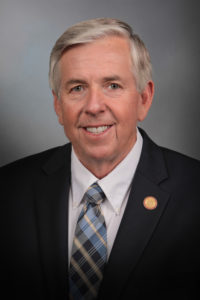

“How it all started was the military,” reminisced Mike Parson, the 62-year-old lieutenant governor in his Jefferson City, Missouri office, after being asked how he got in to politics. “I come from a small town where the flag flew over the post office and our school and we said the pledge of allegiance everyday. I don’t know if I really ever understood the importance of that until I donned the uniform of the military.”
Parson, the 47th lieutenant governor of Missouri, sat down with The Scoop to tell his story of public service and how his slogan, “Positive Politics” was created.
His desk proudly displays photos of his family and farm in Bolivar, Missouri. Parson sat relaxed, drinking a Diet Coke, while recounting the events of his life that led to his career in politics. He spoke of his Army days with great fondness, as they instilled in him an understanding that true public servants do things for other people, oftentimes without recognition.
Parson explains his vision when asked to run for Polk County Sheriff upon his return saying, “And really what I wanted to do was take an old country sheriff’s office and make it in to a professional organization.”
After serving as sheriff for 12 years, Parson served six years as a Missouri state representative and an additional six years as a Missouri state senator. During this time, Parson experienced the negativity often associated with political campaigns.
“All of a sudden your focus becomes winning the election and you’re saying, ‘Whatever it takes, we gotta do it.’ And that was the first time I really felt uneasy because I started to think, ‘I wonder if this person is really like this?’”
These were the thoughts Parson considered when he decided to run for lieutenant governor in 2016. He said he could have easily packed up and went back to the farm, but he made a different decision. “I really wanted to prove to myself, and maybe to a lot of other people, that there’s a better way to do this. We don’t have to destroy one another to win political office. You don’t have to go out there and make up stories about an opponent or try to destroy their character or their honor. I think we’re better than that.”
And that is when the idea of, “Positive Politics” emerged.
Tyler Habiger, a family friend, former staffer, and campaign worker of Mike Parson’s, said of Parson’s lieutenant governor campaign, “He got into the race primarily to change the tone of how elected officials conduct themselves.”
Habiger went on to explain the negativity that soon characterized this particular race, commenting on how Parson’s opponent, “ran several ads on television and circulated mailers that portrayed Mike in a false light.”
Parson’s reaction to these false ads displayed his theme of, “Positive Politics.” Habiger said, “Point by point, we as a campaign corrected these ads in a grassroots format of everyday Missourians ‘liking’ and ‘sharing’ our posts and graphics… Our message got through, and we won 99/114 Missouri counties on Primary Night and 110/114 counties in November.”

Kyle Aubuchon, another former campaign staffer, echoed many of the same sentiments as Habiger. “When we aired commercials or posted content on the campaign that referenced our opponent, we made sure it was fact-checked and based on issues, not the person.”
He also mentioned how short the campaign was on resources, which forced Parson and his wife, Theresa, to attend many of the events that campaign staffers typically attend on behalf of their candidates.
Aubuchon recounted, “Every candidate does this, but Mike was noticeably stronger than the other candidates on the ballot. At the end of the day, when convincing citizens to vote for you, nothing beats meeting and talking to the candidate in person.”
As his Executive Assistant signaled that the time for his next engagement on the busy daily agenda had come, Parson concluded the interview with the legacy he wishes to leave as Missouri lieutenant governor.
“At the end of the day, when I leave this office, I just want the public to be able to say, ‘You know what? He did a pretty good job when he was there. And he tried to make Missouri a little better.’ If they say that, I’ve had a great career.”